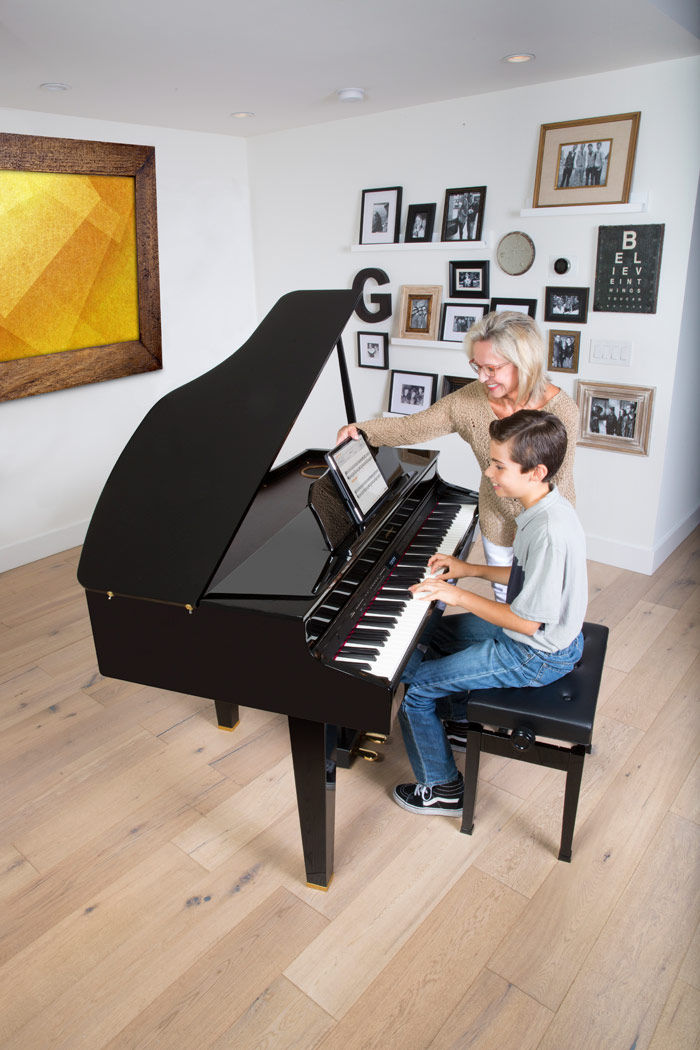Building Better Brains (And Why Digital Pianos Are Perfect for Young Learners)
- Electric Piano Land

- Mar 3, 2025
- 3 min read
Updated: Aug 29, 2025
Ever wondered what happens in your child's brain when they sit down at a piano? Recent research from Northwestern University's Auditory Neuroscience Laboratory has revealed fascinating insights about how music education shapes young minds, and we're excited to share why digital pianos can be an excellent starting point for this journey.
The Science Behind the Music Magic
Research has uncovered remarkable connections between musical training and brain development. After two years of active participation in music classes, children show significant improvements in both speech processing and reading scores. They become better at distinguishing between similar sounds like "bill" and "pill" - a crucial skill for learning to read and language development.

The benefits extend far beyond basic language skills. Studies show that students who take music in middle school score significantly higher on 9th-grade algebra assignments than those who don't. This connection between music and mathematics isn't surprising when you consider how music training develops pattern recognition, sequence learning, and abstract thinking - all crucial skills for mathematical success.
What's particularly exciting is how these benefits persist throughout life. Research reveals that people who took music lessons as children show enhanced sound processing decades later, even if they haven't played an instrument in up to 50 years. These individuals demonstrate stronger neural processing of sound and better auditory working memory, advantages that help with everything from learning new languages to maintaining cognitive function as we age.
Starting Early: The Advantages of Childhood Music Education

The early years are crucial for musical development. Research shows that toddlers who engage with music demonstrate stronger pre-reading abilities and enhanced fine motor skills. Musical training strengthens the neural mechanisms that differentiate between speech syllables, creating a foundation for strong reading and language skills.
Even more impressive is how musical training enhances everyday listening skills. Children with musical training show improved ability to:
- Perceive speech in noisy backgrounds
- Maintain attention during complex auditory tasks
- Keep sounds in memory
- Process complex patterns of sound
These skills prove invaluable in today's busy classroom environments and continue to benefit children throughout their academic careers.
Why Digital Pianos Work So Well for Learning
Modern digital pianos offer unique advantages that make them particularly suitable for beginning students:
Practice-Friendly Features
- Headphone compatibility for quiet practice at any time
- Built-in metronomes to develop strong rhythm skills
- Recording functions to help students evaluate their progress
- Adjustable volume for comfortable playing
- Multiple sound options to keep practice engaging
- Split keyboard functions for duet practice with teachers
Educational Benefits
- Weighted keys that simulate acoustic piano touch
- Consistent, perfect tuning for developing proper pitch recognition
- Built-in lesson functions in many models
- MIDI connectivity for using educational software
- Instant feedback on key pressure and timing
- Practice tracking and progress monitoring features
Family-Friendly Advantages
- Space-efficient design for any home
- No tuning or regular maintenance required
- Multiple volume settings for different times of day
- Easy to move when needed
- Durable construction for years of use
- Cost-effective investment in music education
Whether you're considering a Yamaha, Roland, or Kawai, today's digital pianos combine traditional piano feel with modern learning technology. Each brand offers models specifically designed with students in mind, featuring authentic piano touch and sound, interactive learning tools, and construction that will last through years of practice and development.
Supporting Your Child's Musical Journey
At Electric Piano Land, we understand that starting music lessons is a significant step. We're here to help you find the perfect instrument that matches your child's needs and your family's lifestyle. Our collection of high-quality digital pianos includes options for various budgets while maintaining the features essential for successful learning.
The research is clear: musical training enhances auditory skills and creates neural pathways that benefit multiple areas of learning and development. Even basic rhythm abilities like tapping to a beat correlate with reading and cognitive skills. A digital piano provides these developmental benefits while offering convenient features that make learning enjoyable and sustainable.
Ready to begin? Visit us at Electric Piano Land in Honolulu to explore our student-friendly digital piano collection. Our knowledgeable staff specializes in helping families find the right instrument to start their musical journey. Let's work together to give your child the gift of music education!





Comments